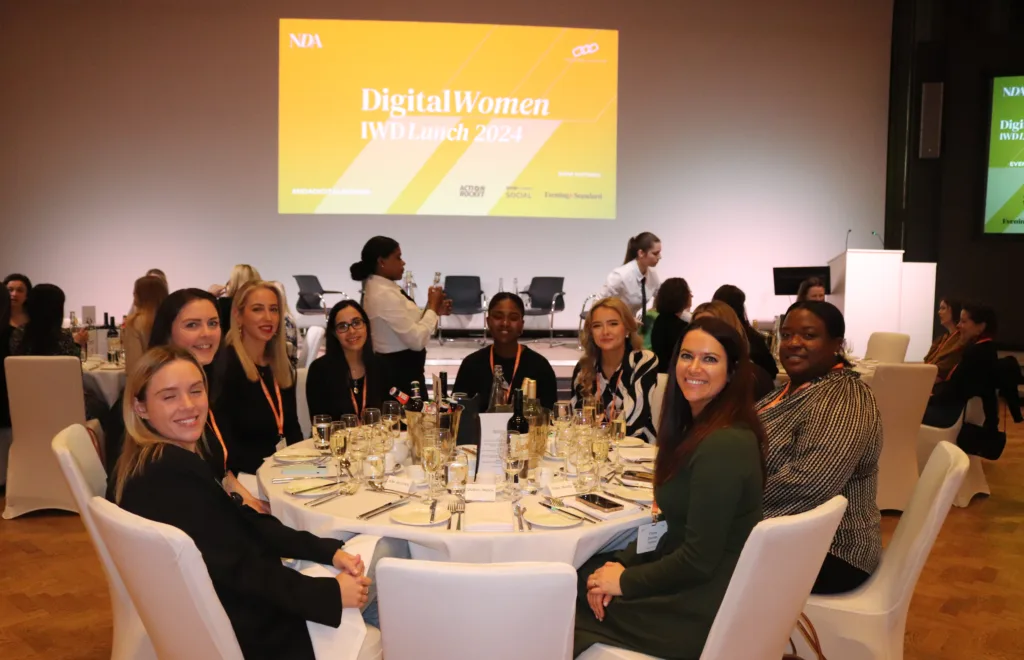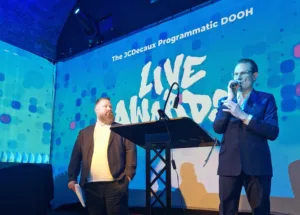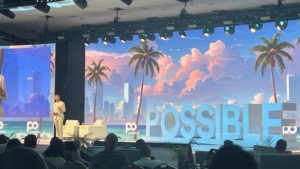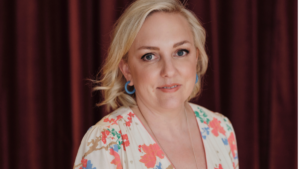New Digital Age and The Advisory Collective recently hosted the 2024 Digital Women International Women’s Day (IWD) Lunch in partnership with ActionRocket, BBC Studios Social, and Evening Standard. Professionals from across the publishing, ad tech and agency sectors gathered for an afternoon of conversation, debate, good food, and the opportunity to hear from some industry-leading women on IWD.
Lydia Oakes, COO & Co-Founder of Bluestripe Group (publisher of New Digital Age) welcomed the attendees before introducing Jasmine Dawson, SVP Digital at BBC Studios, who delivered a candid and powerful recap of her own experiences as a working mother in the digital media industry.
“The stats are undeniable and the case for diversity and inclusion is watertight, but our industry still trails behind with a gender pay gap of 15.3% in comparison to the UK average of 12.1%,” said Dawson. “As an ambitious working parent of two, I’m focused on the critical action needed to fight against the motherhood penalty.”
Dawson called for “noisy, radical candour” from women, before sharing searingly honest stories from her own life and career.
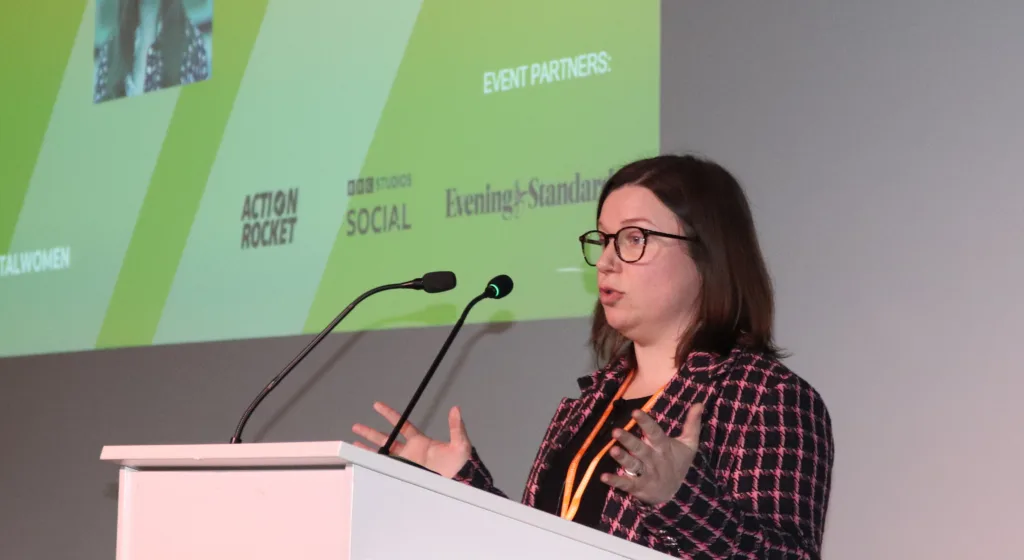
Rabbit holes and recovery
Having undergone intense chemotherapy and radiation treatment in her 20s, Dawson was delighted when she later learned she was pregnant with her first child. However, with a newborn, she found herself feeling exhausted and isolated; and after just four months of maternity leave (standard in the US market), Dawson was scheduled to return to work, a senior agency role in the US. A pre-return meeting with her HR team brought matters to a head.
She said: “I realised that I was hanging by the thinnest of threads. I broke down in the meeting and then again at home with my husband. That started a proper conversation with the people in my life who could help me. I was formally diagnosed with postpartum depression. I have both my real family and my work family to thank for pulling me out. They supported me in my recovery and rebuilding my life.”
However, challenges remained. Following an 18-month long break from her career and a return to the UK, Dawson admitted she felt like a shadow of her former self when she started job hunting. “My first few interviews were disastrous. I was a nervous wreck. Prior to having a child I’d been a senior partner running a global digital account at an incredible agency in New York. Now I was striking out in interview after interview. It was crushing and hammered away at my confidence. In the end, I did what I know so many mothers do: I decided to look at jobs I could do in my sleep, more junior positions for much less money.”
Then came an interview for BBC Studios that was “radically different” in its approach: “They weren’t just interested in my capabilities. They wanted to know how I thought, what my priorities were, how I liked to work, and crucially, what mattered to me.”
Dawson is still there today. “I am valued and encouraged to be authentically me, no matter how much I swear,” joked Dawson. ”In sharing my experience, in being raw and vulnerable, I hope to do more than just shine a light on the issues. I intend to hold myself and you accountable to do more to drive change and take immediate, measurable action.”
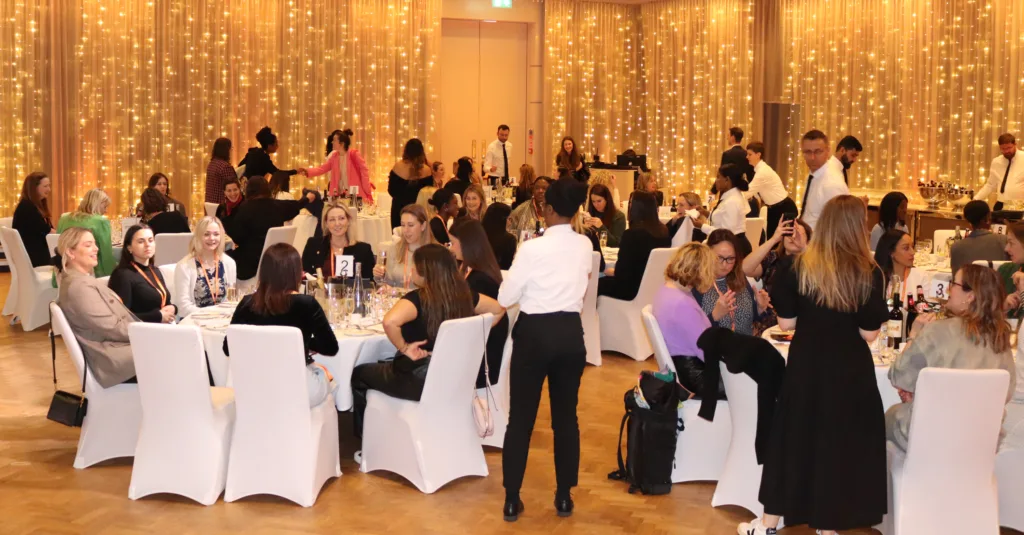
Inclusion matters
Next, Ellie Edwards-Scott, Co-Founder of The Advisory Collective and COO & Co-Founder at WeGame2, chaired a panel discussion on the IWD theme of ‘Inspiring Inclusion,” featuring Jasmin Foye, Digital Ad Sales Account Director, BBC Studios; Christina Lemieux, Executive Strategy Director, PG One, Publicis Groupe; Caroline Lidington, Managing Director UK, Invibes Advertising; and Nikki Sehgal, General Manager at MEFA (Media For All). IWD 2024’s theme of ‘inspiring inclusion’ was the first topic touched on by the expert panel.
Edwards-Scott opened the discussion by addressing several elephants in the room, firstly that there were only three men in attendance at the lunch (and only one not part of the NDA team) and the fact that she had experienced resistance around businesses engaging with IWD. She asked: “Is there a general feeling that companies now feel that we’ve ticked the DE&I box as we’ve been talking about it for the last few years? When in reality there is still a lot of work to do and we’re plateauing as an industry.”
Foye said: “For me, inspiring inclusion is about fostering a safe environment where people from different backgrounds can feel safe and know that they’re valued and respected and heard. Equality isn’t a fad or a phase – it’s a right. Until it’s ingrained in society, we need to keep banging that drum until we’re heard. That doesn’t mean that we can’t talk about other important things as well. For example, I know that sustainability is a big focus for a lot of companies at the moment but that doesn’t mean that Diversity & Inclusion (D&I) need to be squeezed out.
“Digital ad sales is traditionally quite a male-heavy field but, in my first role, I was incredibly fortunate to work in a strong all female team. That was invaluable to me in building my confidence and making me feel that I deserved my space. Today, when I walk into a meeting, I’m often still the only woman in the room, so there’s clearly still lots for the digital media industry to do on inclusion.”
In 2021, research from the Advertising Association revealed that Black and Asian women in particular had the most negative experiences of working in the ad industry. MEFA, a nonprofit social enterprise, which supports Black, Asian and ethnic minorities working in the UK media and advertising industry, has conducted its own research (MEFA Measures) since which echoed the 2021 findings. MEFA’s Nikki Sehgal shared: “We had around 50 members in 2020, but we now have over 900 members. Our research found that Asian women (Muslim and Sikh women in particular)and Black women are still having negative experiences, often feeling isolated or like they don’t belong, so there’s a lot of disenfranchisement and disappointment out there. In response we’ve launched MEFA Circles, which are listening groups that allow those women to dig further into why they are still having these experiences. MEFA will share the findings with the industry and present a call to action to support these groups.
“In terms of businesses investing in women, providing access to training and to a range of coaches and mentors is absolutely key. Mentorship doesn’t always need to be a long term commitment. It can be really useful to focus a couple of sessions on, for example, a particular project-based challenge or an interview or appraisal you have coming up. When we talk about inclusion, especially from a MEFA perspective, we really try to give our members opportunities to attend industry events, secure speaking opportunities and so on, because they don’t necessarily get those opportunities in their workplace.”
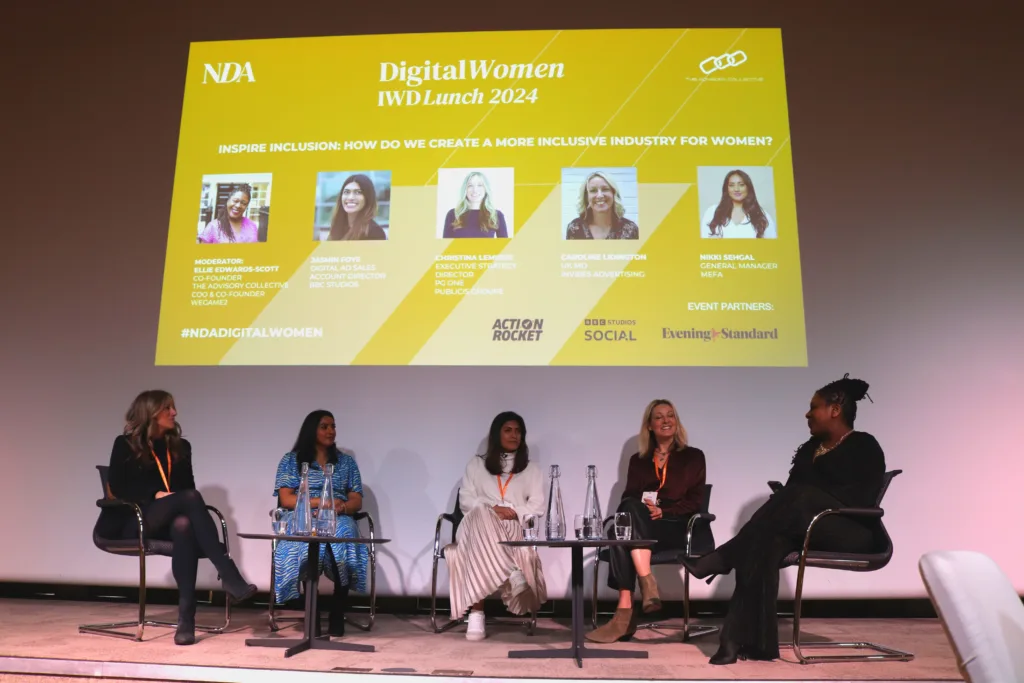
The road ahead
Addressing the persistent pay-gap between men and women (often blamed on ‘career breaks’ due to maternity leave) Lemieux called on business organisations to re-think how they define expertise and experience, which factors into how much different employees are paid within a set salary band. She said: “There is no more intense leadership programme in the world than becoming a new mum. Maternity leave isn’t a ‘break’ but rather a period of rapid learning which sharpens our problem solving skills, agility, adaptability and resilience. These are incredible skills that are immeasurably valuable in your career. If we valued this period of time properly, I think it would go some way to addressing the gender pay gap that we see today.
“Currently women disproportionately take on the role of carer in their families and whether that’s fair or not businesses need to recognise this reality and value it in the workplace. Likewise, women need to have each other’s backs and can benefit from having accountable partners, especially when negotiating salary. If you’re just defending yourself, it can be hard to hold the line. Having a community of women around you can be incredibly powerful.”
Lemieux added: “It’s important that we ‘parent out loud.’. Employees were incredibly flexible throughout the pandemic, turning ironing boards into office desks and running new business pitches with toddlers in the background. Flexibility needs to go both ways and most companies, like Publicis Groupe and PG One, have progressive policies in place which guarantee a level of flexibility. Having knowledge of these policies and the confidence to be vocal about what’s needed to show up at work helps create a culture of understanding and support.”
With more than 30 years of industry experience to draw on, Invibe’s Lidington commented: “My first job in the industry was in ‘91, so I can say with confidence that we’ve moved on leaps and bounds since then. I’m really encouraged to see more men calling out bad practices and unacceptable behaviours and I think we’re starting to see more balanced workplaces, but there’s undoubtedly still a lot to be done.”
Lidington argued that having progressive workplace policies in place can help to shift wider society’s view of parenting and start to address the gender-based bias associated with motherhood: “When a baby is born, a woman becomes a mother, yes, but people also become parents. You wouldn’t dream of giving employees different holiday allocations based on gender, but we offer different maternity and paternity packages as standard. We need to champion the idea that ‘breadwinning’ and ‘caregiving’ are both essential parts of family life that are equally important.
“We also need to ensure that the policies we already have in place to support women are properly communicated and understood. That’s important because you’re not always in a good headspace when you actually need to make use of those policies.”
In keeping with the theme of the day, the gathered audience left inspired to keep inclusion at the top of the organisational agenda and to help drive real change throughout the year.


